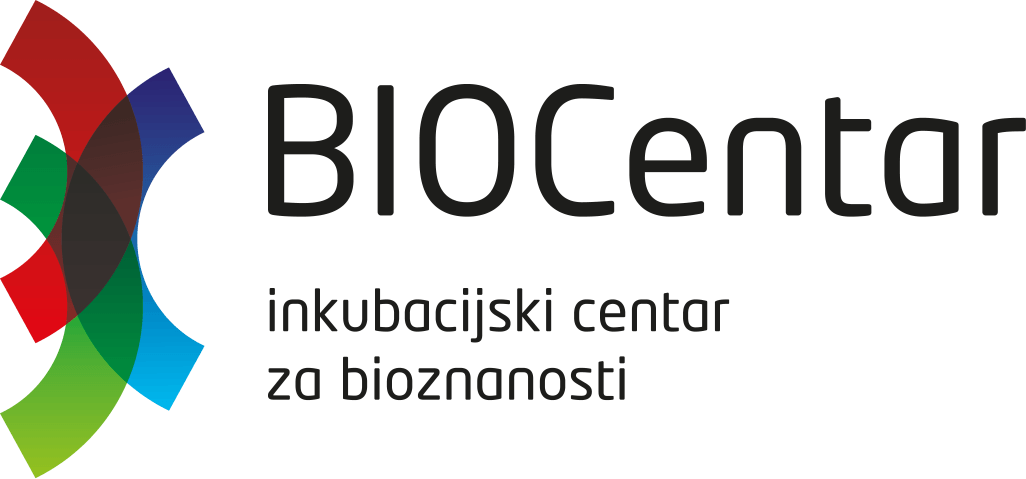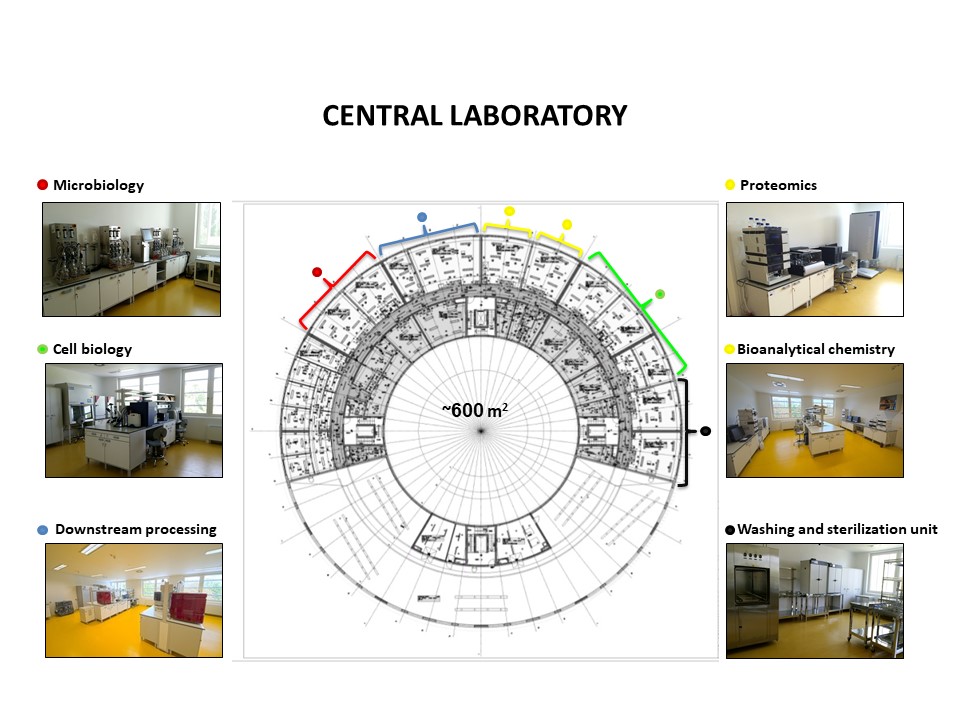Central laboratory (CL) is a core facility designed to offer a range of process development services necessary to develop and commercialize new products.
CL comprises 6 specialized labs (~ 600 square meters total) with state-of-the art equipment, storage areas, washing and sterilization room and offices for permanent staff.
Microbiology laboratory staff:
Maja Marinović, PhD, Head of Microbiology laboratory, e-mail: maja.marinovic@biocentre.hr
Matea Zelenika, M.Eng., Associate, e-mail: matea.zelenika@biocentre.hr
Mateja Lozančić, PhD, Senior Associate, e-mail: mateja.lozancic@biocentre.hr
Microbiology Laboratory is specialized in recombinant protein production and purification in a µg to mg scale. We offer production process development for biopharmaceuticals and biosimilars. We work with various microorganisms, optimize growth conditions, test different treatments and study metabolites and by-products. We offer bacteria and yeasts cell propagation and banking.
Microbiology Laboratory staff organizes workshops for groups or tailored to suit client’s specific needs.
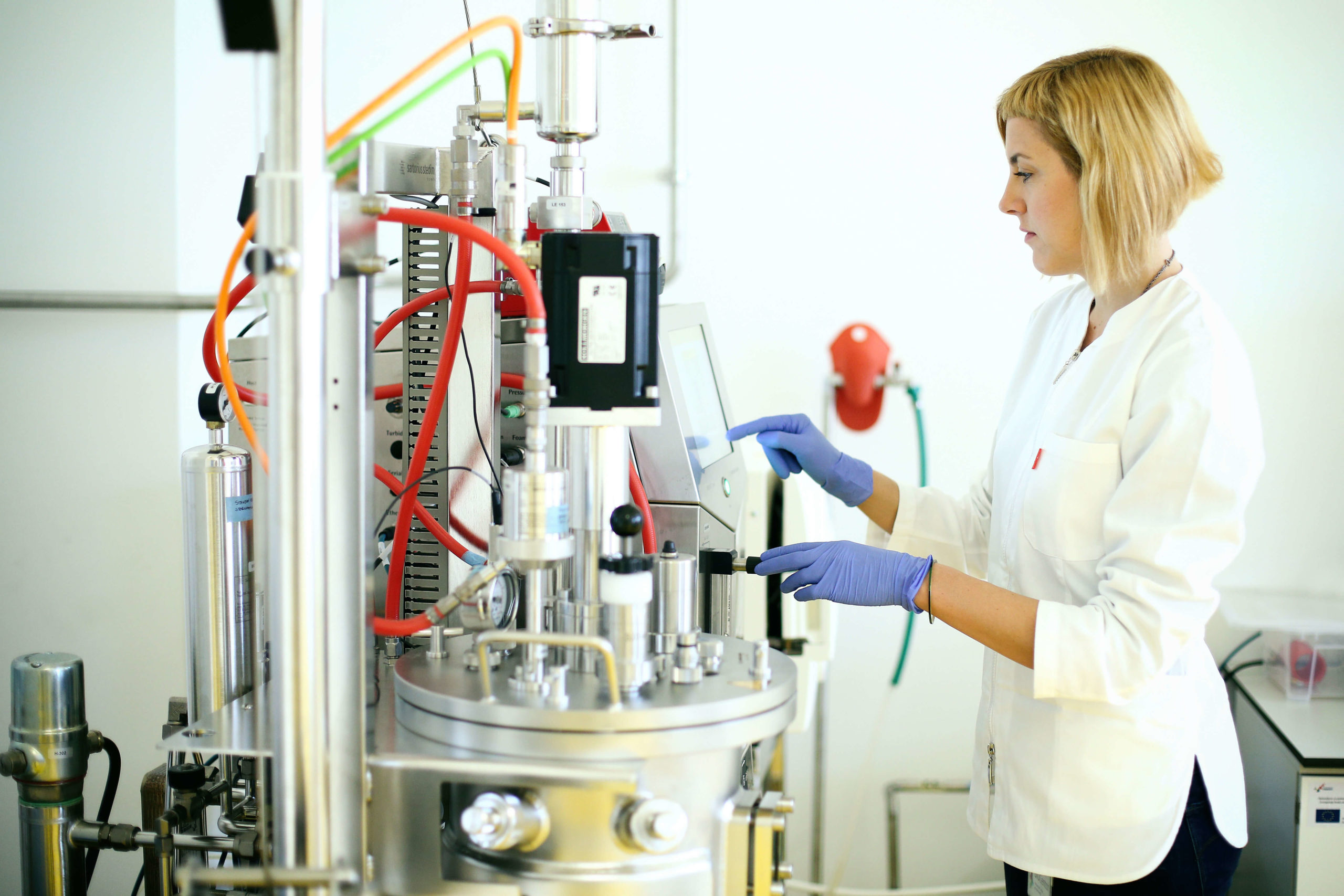
BACTERIA TRANSFORMATION
Chemically competent cells are transformed by heat shock in order to insert DNA of interest. Positive cells are selected and stored at – 80°C in glycerol for further use.
PLASMID PROPAGATION AND PURIFICATION
After transformation and propagation of competent E. coli, plasmid DNA is isolated (mini, midi or maxi prep) and analysed on agarose gel. Spectrophotometric DNA quantification is performed and A260/A280 absorbance ratio measured.
BIOMASS AND PROTEIN PRODUCTION
Recombinant protein production begins with cell transformation and cell cultivation in suitable conditions. Fermentation can be performed in a range from 0,1 to 30 L. Twelve 0,5 L and two 2 L bioreactors can be ran in parallel, before upscaling production to a 30 L bioreactor. In order to increase yield of a desired product, we implement different optimization strategies: selection of nutrient medium, carbon source, temperature, pH, aeration, chemical inducer concentration and overall processing time.
PROTEIN PURIFICATION
Downstream processing laboratory performs protein purification. The process starts with mechanical cell lysis and/or separation, followed by protein isolation and purification using preparative chromatography. Downstream processing also includes sample concentration and diafiltration (desalting and buffer exchange).
PROTEIN QUALITY CONTROL
Proteomics laboratory performs protein quality control. SDS – PAGE and western blot analysis are done throughout protein production process – from optimization to scale-up. Quality control includes protein quantification and LC – MS/MS protein identification.
MOLECULAR BIOLOGY
Microbiology laboratory offers isolation, purification and analysis of microbial DNA and RNA. We perform mutagenesis, cloning, end-point and quantitative PCR. In addition to standard microbiology techniques, we also use PCR and qPCR to identify and quantify microorganism in various samples – probiotics, environmental samples, and food items (beer, wine, juices).
EQUIPMENT
Bioreactors
BIOSTAT Qplus 12 x 0.5 L MO, BIOSTAT B Twin 2 L MO, BIOSTAT Cplus 30 L MO (Sartorius)
Homogenizers
Panda Plus high pressure homogenizer (Gea Niro Soavi)
Bandelin ultrasonic homogenizer (Sonoplus)
Other
NanoDrop One spectrophotometer (Thermo Scientific)
Continuous flow centrifuge (Sorval Stratos)
Innova S44i incubator shaker (Eppendorf)
AriaMx Real-Time PCR System (Agilent)
Please visit our Downstream processing and Proteomics laboratories to see more available equipment.
Cell biology laboratory staff:
Dora Markulin, PhD, Head of laboratory, e-mail: dora.markulin@biocentre.hr
Cell Biology lab offers services in animal cell culture handling and expression of recombinant proteins on a laboratory and semi-industrial scale in separate or parallel bioreactor systems. We offer process development and cell bank maintenance, extensive number of biochemical and cell biology assays using the standard molecular biology methods (e.g. flow cytometry, PCR, qPCR).
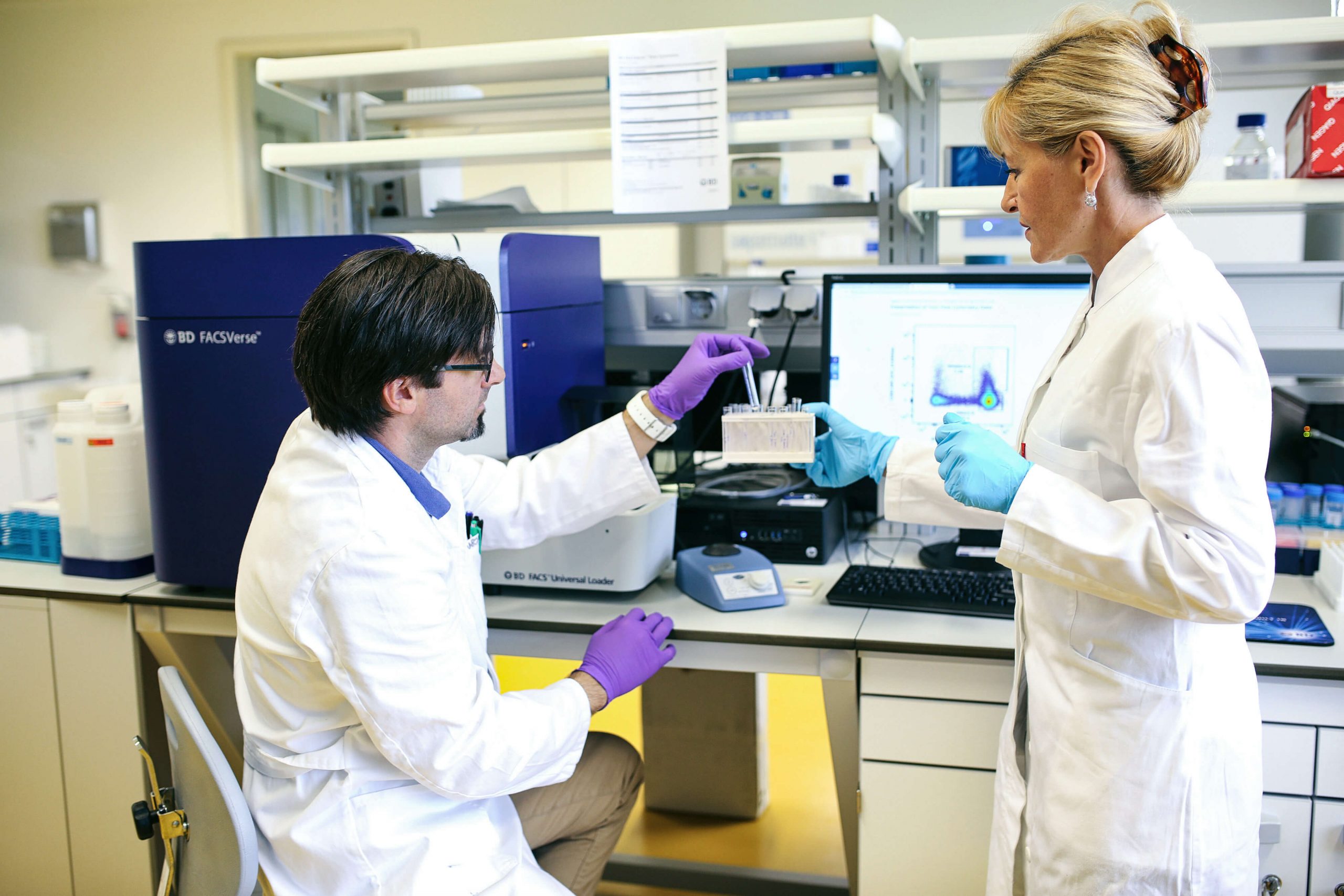
CELL CULTURE CULTIVATION AND LABORATORY SCALE ASSAYS
We offer services of human and animal cell cultures handling on a laboratory scale:
- adherent cell lines and cell lines in suspension
- primary cultures, co-cultures, 3D cultures
- cytotoxicity and proliferation assays (MTT)
- mycoplasma testing
- cell bank storage
CELL CULTURE CULTIVATION ON A SEMI-INDUSTRIAL SCALE
We offer cultivation of cell cultures on a semi-industrial scale:
- cell cultivation in bioreactors of different volumes: 0.5 L (up to 12 parallel bioreactors); 2 L (2 parallel); or 30 L bioreactor
- process optimisation
- production of recombinant proteins, cytokines, growth hormones, hematopoietic growth factor, antibodies, and similar
FLOW CYTOMETRY
We offer flow cytometry analysis (3 lasers, BD FACSVerse; 405, 488 and 633 nm):
- cell viability tests
- apoptosis / necrosis cell death analysis
- measurement of proliferation markers
- cell cycle analysis
- cell line validation using cell-specific markers
- detection of fluorescent proteins
- quantification of transfection
- FCS data analysis in FlowJo software
MOLECULAR BIOLOGY
We offer an array of standard molecular biology tests:
- DNA, RNA, and protein extraction from tissues, cell suspensions, plants, and similar
- PCR analysis
- qPCR analysis
- ELISA
- Western blot
- Lentiviral and adenoviral vector production
- Stable and transient cell transformation
- CRISPR/CAS9 genome engineering
EQUIPMENT
Cytometer
BD FACSVerse flow cytometer (3 lasers: 405, 488, and 633 nm)
Bioreactors
Sartorius BIOSTAT Qplus 12 fold 0,5 L CC
Sartorius BIOSTAT B Twin 2 L CC
Sartorius BIOSTAT C Plus 30 L CC
Other
Agilent AriaMx Real-Time PCR System
Applied Biosystems SimplyAmp thermal cycler
Hidex Chameleon V microplate reader
Invitrogen Countess 3 Automated Cell Counter
Sorvall Stratos continuous flow centrifuge
Downstream processing laboratory staff:
Marina Markeš, M.Sc., Head of laboratory, e-mail: marina.markes@biocentre.hr
Marija Ivić, M. Sc., Associate, e-mail: marija.ivic@biocentre.hr
Majority of our services revolve around biological material downstream processing, such as isolation of small molecules, biomolecules, or native and recombinant proteins from various samples. Services include process optimization on a laboratory scale, and transfer to a pilot production scale.
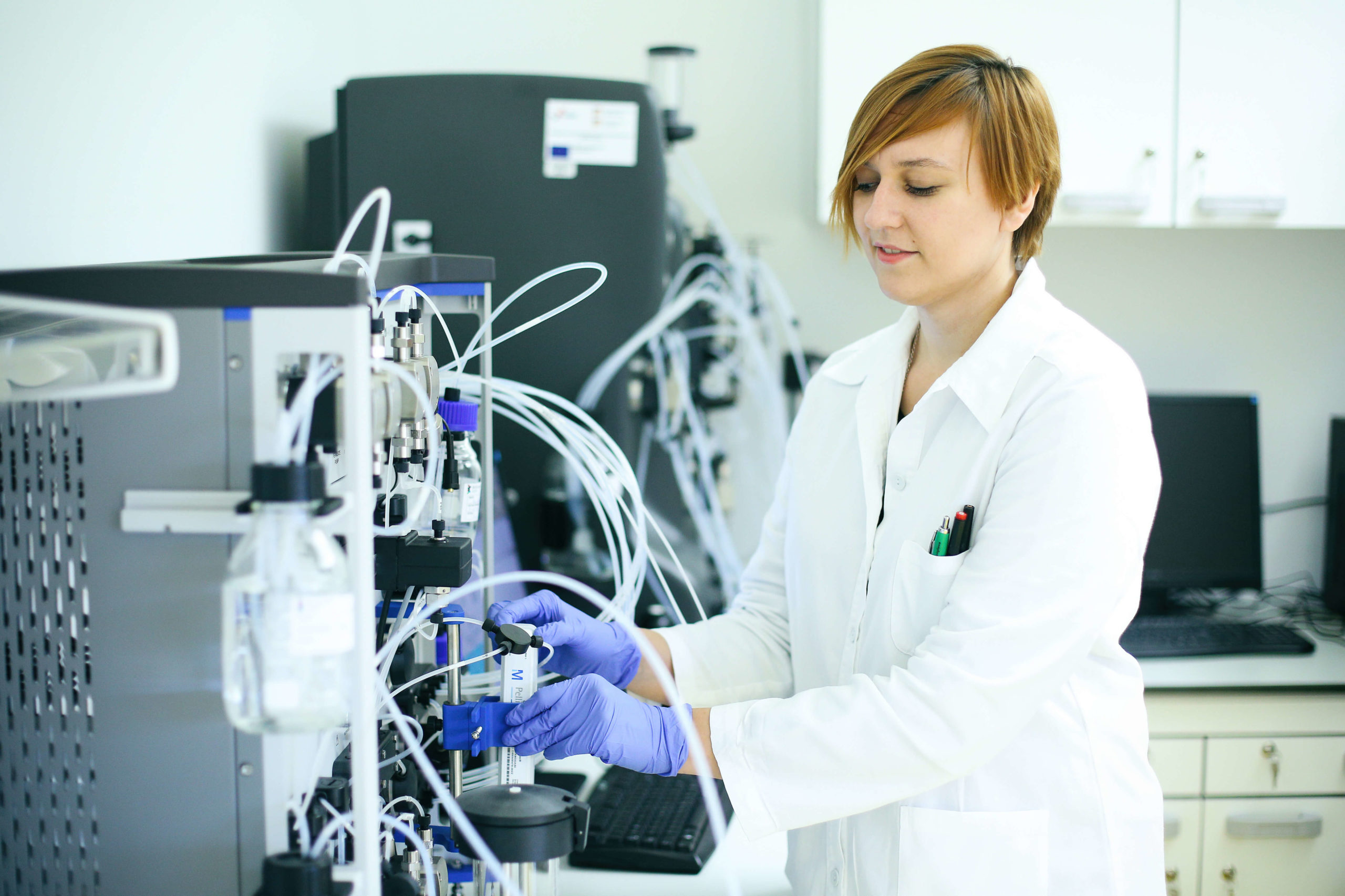
DOWNSTREAM PROCESSING
The majority of our services revolve around biological material downstream processing – the isolation of small molecules, biomolecules, native and recombinant proteins from various samples. Our services include process optimisation on a laboratory scale, and transfer to a pilot production scale.
PROCESSING OF COMPLEX MIXTURES
We use preparative liquid chromatography to separate biomolecules or small molecules from complex mixtures. Depending on the physiochemical properties of both, the sample and the analyte, we chose from a range of techniques: ion exchange chromatography, size exclusion chromatography, affinity chromatography, reversed – phase chromatography etc.
Complex mixtures can be fractionated based on a specific property, e.g. ionic strength, molecule size, and the obtained fractions can be analyzed and characterized further. By combining chromatography techniques, we can narrow down the isolation procedure to a couple of, or a single molecule for targeted analysis.
DIAFILTRATION AND CONCENTRATING
We use tangential flow filtration to concentrate a sample, or to exchange a buffer. We can process samples from half a liter to several tens of liters.
FROM A LABORATORY TO A PILOT SCALE
The Laboratory is equipped to accommodate processing on different scales – from modest sample quantities to a pilot production scale. We develop and optimize downstream processing procedure on a laboratory scale, and then scale up to a desired volume.
EQUIPMENT
Preparative chromatography systems:
ÄKTA Avant 25, GE Healthcare Life Sciences
ÄKTA Avant 150, GE Healthcare Life Sciences
ÄKTA Pilot, GE Healthcare Life Sciences
Tangential flow filtration systems:
ÄKTA Crossflow, GE Healthcare Life Sciences
SARTOFLOW Advanced, Sartorius
Bioanalytical laboratory I (chemistry) staff:
Anita Šporec, PhD, Head of laboratory, e-mail: anita.sporec@biocentre.hr,
Jasna Jakovljević, Mag. Chem., Senior Associate, e-mail: jasna.jakovljevic@biocentre.hr,
Diana Nejašmić, M. Eng., Associate, e-mail: diana.nejasmic@biocentre.hr
Our team of experts develops new analytical methods from scratch, improves and expands existing methods, identifies shortcomings, and troubleshoots and fixes problematic analytical methods. The methods we have developed have been successfully implemented in a large number of projects and fields ranging from the pharmaceutical and food industries to biomedicine and biotechnology.
Our clients are academics and industry experts who, due to a lack of time, equipment or specific knowledge contract our laboratory to solve complex analytical problems. We provide fully established protocols for analytical methods development, validation and/or transfer, and we readily collaborate with our clients throughout the process.
Bioanalytical laboratory I (chemistry) organizes hands-on gas and liquid chromatography training. Workshop schedule and full description can be found online at BIOEDUCATION. In addition to general chromatography workshops, we provide tailored chromatography and mass spectrometry training, to suit client’s specific requirements and time schedule.
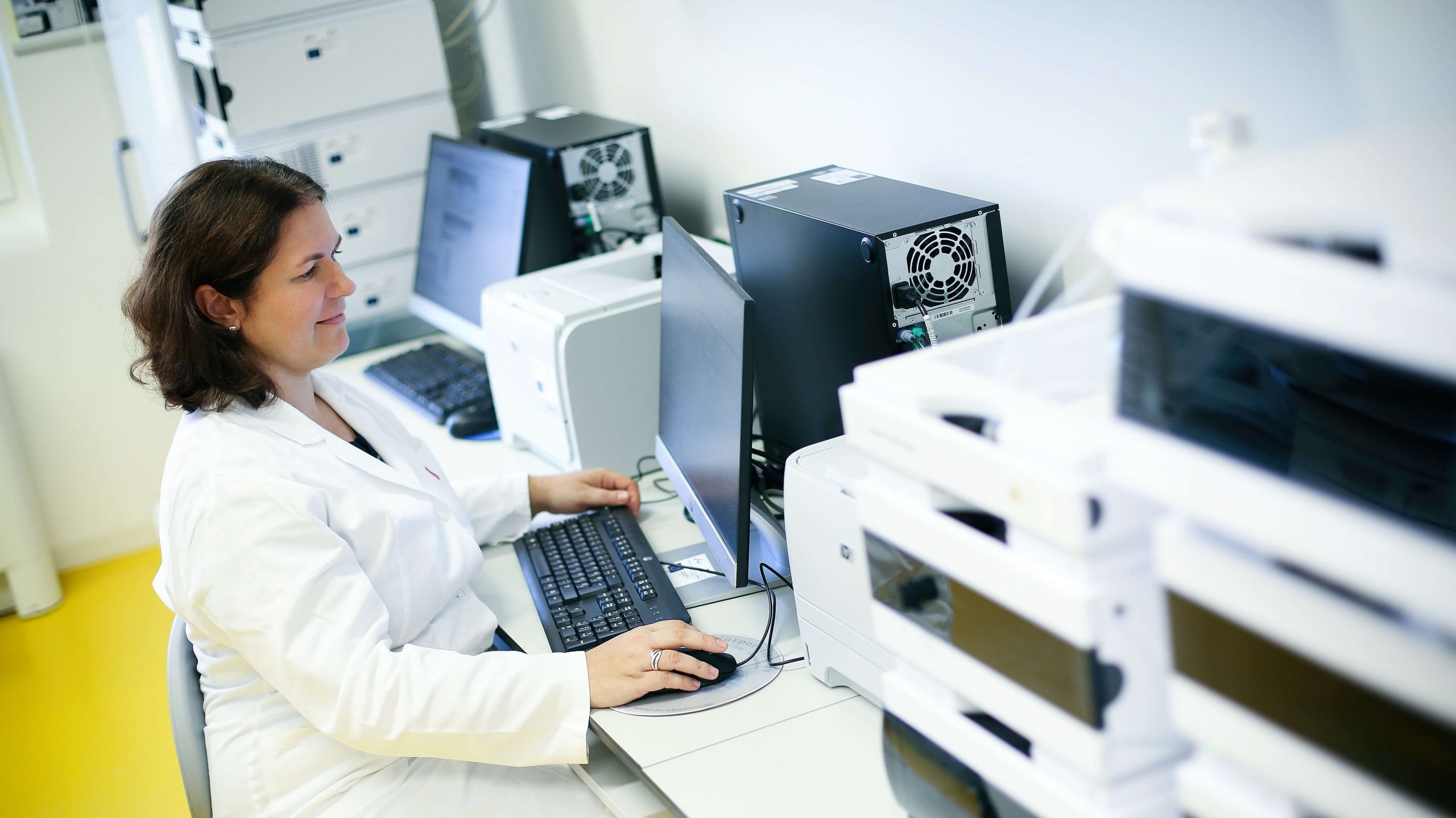
Analytical services for the pharmaceutical, chemical and cosmetic industries
Method development and validation of analytical methods using gas and liquid chromatography as well as providing analysis for:
- Quantification and identification of active pharmaceutical ingredients (APIs), preservatives, antioxidant and impurities in raw materials, intermediates, and finished products
- Quantification and identification of excipients: polyethylene glycols (PEGs), alcohols and higher alcohols, as well as fatty excipients for ointments and gels (e.g. lanolin, white soft paraffin, yellow paraffin, vegetable oils such as castor oil and corn oil)
- Analytical methods for cleaning validation with the purpose of detecting and quantifying residues of active ingredients or other components on equipment surfaces (e.g. inox, enamel, polypropylene glycol, ethylene glycol, etc.)
- Quantification of active components from plant extracts used for oral solutions and syrups
- Quantification and identification of unknown volatile impurities using gas chromatography with headspace or liquid sample injection coupled with mass spectrometry
- Quantification and identification of impurities from contact packaging (rubber materials) as potential leachable using gas and/or liquid chromatography coupled with mass spectrometry
- Titrimetric determination of acid number, hydroxyl value, iodine value, peroxide value, saponification value, ester value in raw materials for pharmaceutical and cosmetic products
- Quantitative analysis of alcohol content by volume or alcohol content by mass as well as impurities in raw materials and finished products of disinfectants
- R&D analytical support during product development and formulation by analysing bulk drug materials, intermediates, drug products and impurities, as well as during out-of-specification investigations and stability studies
Analytical services for plant materials analyses
- Method development and analysis of bioactive components such as natural insecticides, water soluble vitamins, fatty acids, carbohydrates, polyphenols, carotenoids, condensed tannins, total and organic acids, chlorophyll and antioxidative activity by DPPH method
- Aroma profile analysis of plant species and essential oils by gas chromatography coupled with mass spectrometry
- Analyses for different plant parts such as leaves, pulp / fruits, pits or seeds by different extraction methods (e.g. in olives, prickly pear, tangerines, lettuce, beans or strawberries
Analytical services for food and beverages analyses
- Craft beer analysis, including pH determination, colour, bitterness, alcohol by volume and alcohol by mass
- Liquor and spirits analysis, including alcohol by volume, alcohol by mass and aroma profiling by gas chromatography coupled with mass spectrometry
- Analysis of acrylamide in a variety of fried food samples such as chips, coffee, waffles and cookies by liquid chromatography coupled with mass spectrometry
- Analysis of biogenic amines (histamine, cadaverine, putrescine, spermine, spermidine, tryptamine, tyramine, 2-phenyl-ethylamine) in fish and fish products by liquid chromatography with fluorescence detection
- Analysis of spices, seasonings and flavourings: identification of unknown volatile impurities and quantification of known active components by gas chromatography with flame ionisation detector (GC-FID) or coupled with mass spectrometry (GC‑MS/MS)
- Analysis of protein powders: condensed tannins and trypsin inhibitor activity (TIA)
- Aroma profiling of fresh meat (e.g. lamb, pork, beef), meat products (e.g. sausages), and delicatessen (Croatian traditional meat products, e.g. buđola, šokol, etc.) by gas chromatography coupled with mass spectrometry (HS-SPME-GC/MS/MS)
- Analysis of fermented beverages (e.g. kombucha fermented tea): assay of sugars, alcohols, phenols and vitamins
Analytical services for biological samples analysis
- Analysis of volatile and non-volatile metabolites as organic acids, sugars or higher alcohols from cell lysates or biomass
- Method development and analysis of metabolic profiles by identifying compounds formed by different microorganism metabolic pathways
- Analysis of known toxic metabolites in biological fluids (e.g. rat urine) by liquid chromatography coupled with mass spectrometry
- Fatty acid profile: analysis of 37 individual fatty acids in human serum by gas chromatography coupled with mass spectrometry
Analytical services as a part of clinical research
- Quantification of residual dimethyl sulfoxide in cryopreserved tissues after rinsing and thawing of the tissue by gas chromatography coupled with mass spectrometry
- Currently in process: method development for quantification of residual antibiotics after rinsing stored tissues by liquid chromatography coupled with mass spectrometry
INSTRUMENTS
Agilent Technologies HPLC-DAD-UV/VIS
Agilent Technologies HPLC-RID
Agilent Technologies HPLC-FLD
Agilent Technologies LC-MS/MS
Agilent Technologies GC-FID
Thermo Scientific GC-MS/MS
Cary 100 UV/VIS spectrophotometer
Cary Eclipse fluorescence spectrometer
Bioanalytical laboratory II (proteomics) staff:
Dr. sc. Ana Butorac, PhD, Head of laboratory, e-mail: ana.butorac@biocentre.hr
Rea Bertoša, M.Eng., Associate, e-mail: rea.bertosa@biocentre.hr
Vanja Kelava, Mag. Appl. Chem., Senior Associate, e-mail: vanja.kelava@biocentre.hr
Željka Stanečić, M. Eng., Junior Associate, e-mail: zeljka.stanecic@biocentre.hr
The Bioanalytical laboratory II (proteomics) services are focused on protein characterization and the analysis of complex protein mixtures using both targeted and untargeted approaches. Additionally, our laboratory provides higher-order protein structures analysis. We consistently organize practical workshops and offer personalized trainings for our clients.
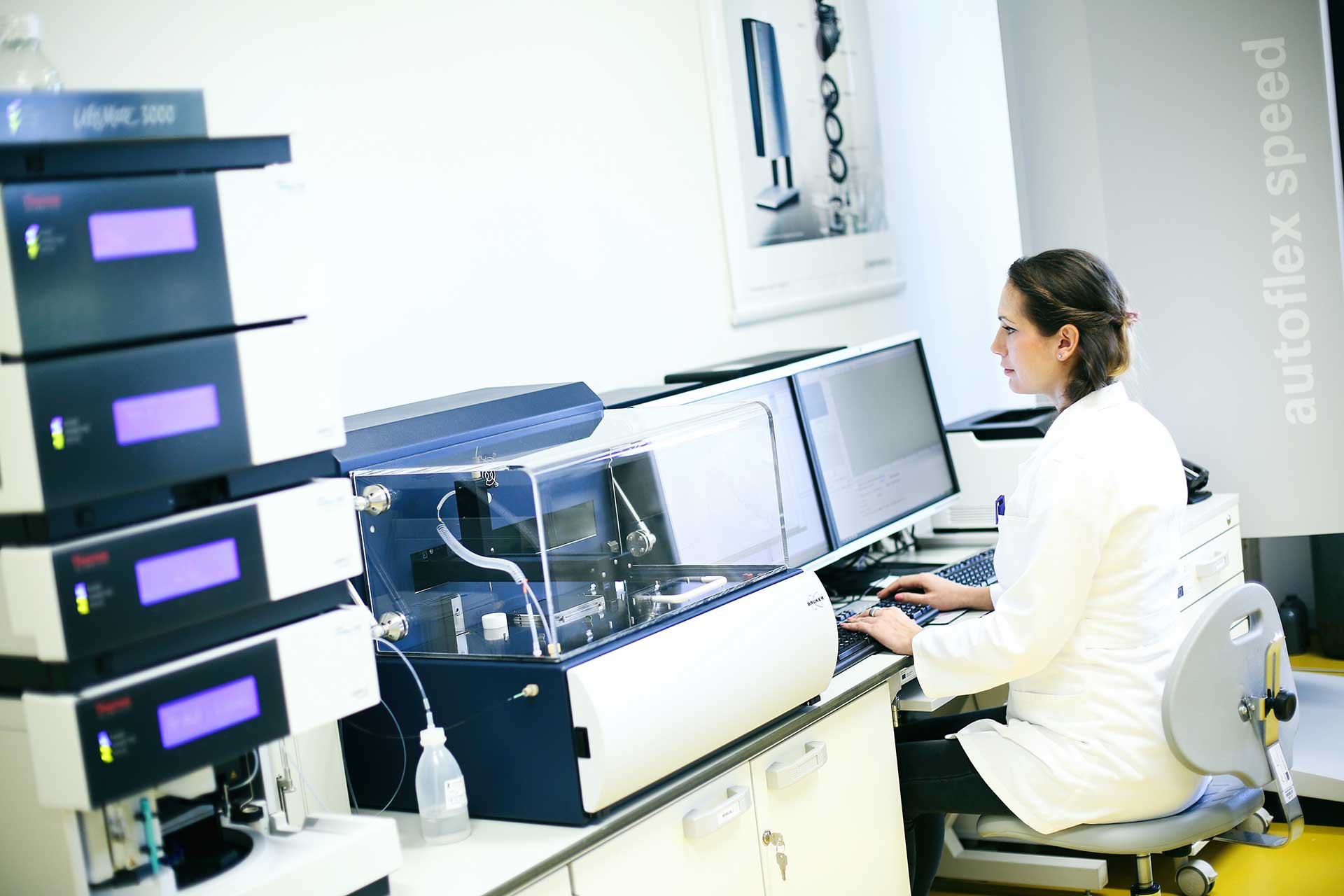
PEPTIDE MASS FINGERPRINTING OR PEPTIDE MAPPING
Involves protein molecule cleavage using a specific proteolytic enzyme and analysing the resulting peptide mixture using mass spectrometry (MS). Analyses can be subjected to direct MS measuring or on-line connected to liquid chromatography (LC-MS). Peptide mass fingerprinting can be extended to a protein database search for sequence confirmation. Additionally, peptide mass fingerprinting can also be extended to de novo sequencing.
MOLECULAR WEIGHT ANALYSIS
The intact molecular weight MS techniques offer accuracy of measurement over a wide molecular weight range. Direct matrix assisted laser desorption ionization mass spectrometry (MALDI-MS) is used for single protein analysis, and liquid chromatography with MALDI-MS detection is used for complex mixtures. Our gel electrophoresis service offers molecular weight measuring and characterisation of impurities in biopharmaceutical products. Additionally, gel electrophoresis can be extended to protein identification through in-gel digestion, tandem MALDI-MS analysis (MS/MS) and database search, or with Western blot analysis.
LIQUID CHROMATOGRAPHIC PATTERNS
We offer a wide range of LC techniques for protein/peptide analysis: size exclusion (SEC), reversed-phase (RP) and ion exchange chromatography (IEX). Additionally, after LC separation we offer MS analysis.
PROTEIN SEQUENCING
Involves MALDI top down sequencing (MALDI-TDS) and de novo sequencing. MALDI-TDS provides protein identification through a database search and simultaneous assignment of the N- and C-termini of up to 70 residues from either terminus. In de novo sequencing for the identification of unknown proteins, the amino acid sequence is deduced without prior knowledge of the DNA or protein sequence. We offer a de novo sequencing service that reveals structural information using laser induced fragmentation within a mass spectrometer (LIFT).
AMINO ACID ANALYSIS
Provides information on the amino acid composition of proteins, peptides and other biological samples containing primary or secondary amino groups within a molecular structure. Amino acid analysis allows quantitation of free amino acids, as well as quantitation of amino acids released from macromolecules.
ELLMAN’S TEST
Ellman’s test is used to determine the concentration of free thiol groups in proteins by spectrophotometric measurement at 412 nm. Ellman’s reagent 5,5′-dithio-bis-(2-nitrobenzoic acid) (DTNB) reacts with a free thiol group to give a disulfide and TNB. The target of DTNB in this reaction is to conjugate the base of the free thiol group, the resulting TNB is colored species in the reaction. The concentration of free thiol groups in the sample is determined using a standard curve containing known concentrations of compounds containing thiol groups, such as cysteine.
ISOELECTRIC FOCUSING OF PROTEINS
Isoelectric focusing enables the separation of proteins in a gel based on their isoelectric point. Isoelectric focusing is performed on polyacrylamide gels with a pH gradient. Protein bands obtained by isoelectric focusing can be further analyzed with a MALDI-TOF/TOF instrument for the purpose of protein identification.
PROTEOMICS ANALYSIS
Our liquid chromatography with tandem mass spectrometry detection (LC-MS/MS) services provide targeted and non-targeted proteome analysis.
Our non-targeted proteomics, or “shotgun” proteomics service, typically involves in-solution or in-gel protein digestion using a suitable proteolytic enzyme. The resulting peptides are then separated using nano-LC coupled to a TripleTOF 6600+ mass spectrometer.
We employ two approaches for generating proteomic data: data-dependent acquisition (DDA) and data-independent acquisition (DIA). The DDA approach is primarily focused on cataloguing proteins from the sample and for building of spectral libraries. On the other hand, the DIA approach is specifically designed for determining changes in protein expression between samples.
Our targeted proteomics service targets specific peptides in a complex mixture and determines their presence. This analysis usually utilises a triple quadrupole mass spectrometer (QQQ). Targeted proteomics is used for verification of knockdown targets, for quantification of a peptide/protein in a complex mixture, and for monitoring a specific protein across samples or during a time-course experiment.
HIGHER ORDER PROTEIN STRUCTURE
Circular dichroism (CD)
Spectroscopic analysis for protein secondary structure assessment (alpha helix/beta sheets).
Differential scanning calorimetry (DSC)
Provides protein thermodynamic parameters measurements (e.g. melting point determination) to screen protein stability.
EQUIPMENT
Mass spectrometry
Sciex TripleTOF® 6600+ System; UHPLC-MALDI TOF/TOF (Thermo Fisher Scientific & Bruker Daltonics); LC-(QQQ)-MS/MS (Agilent Technologies).
Liquid chromatography
HPLC-DAD (Agilent Technologies); HPLC-RID (Agilent Technologies); HPLC-FLD (Agilent Technologies).
Other
CD/LD spectropolarimeter (Jasco Europe); Differential scanning calorimeter (GE Healthcare Life Science).
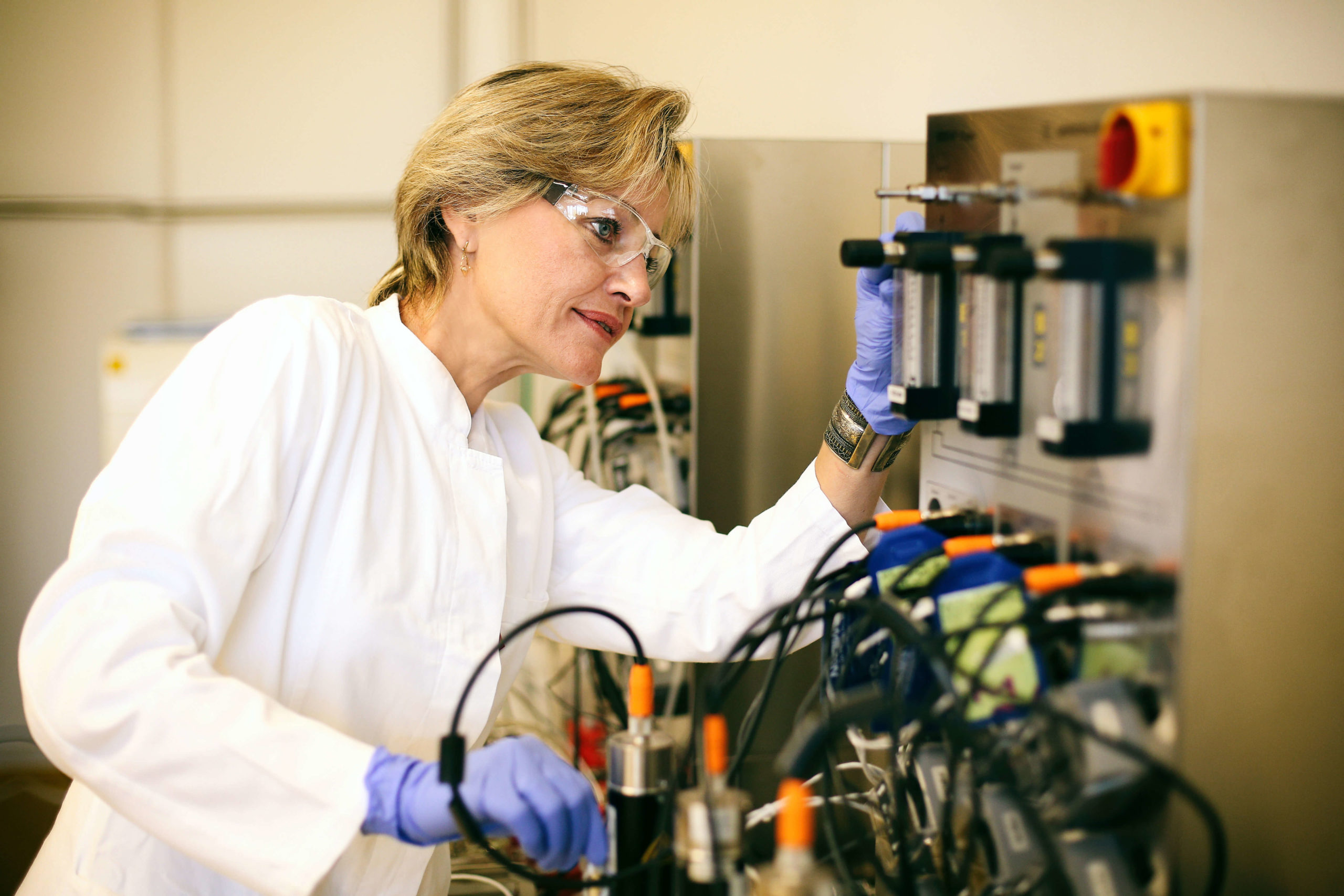
The Washing and Sterilization Laboratory provides laboratory dishwashing service in professional Smeg washing machines, which have numerous washing programs for different types of glassware and different types of soiling. After washing, the dishes are dried or sterilized in a Pol-Eko Apparatura dry sterilizer.
The same unit also provides autoclaving – sterilization service in the Tuttnauer 66120-1 VEP autoclave, chamber volume 450 l. The autoclave has different programs, i.e. it has the ability to program the pressure, temperature and time period of the autoclave, depending on the type of material to be sterilized.
The resulting waste from the microbiology and cell biology laboratories is sterilized-autoclaved and thus reduced to a harmless level before disposal.
